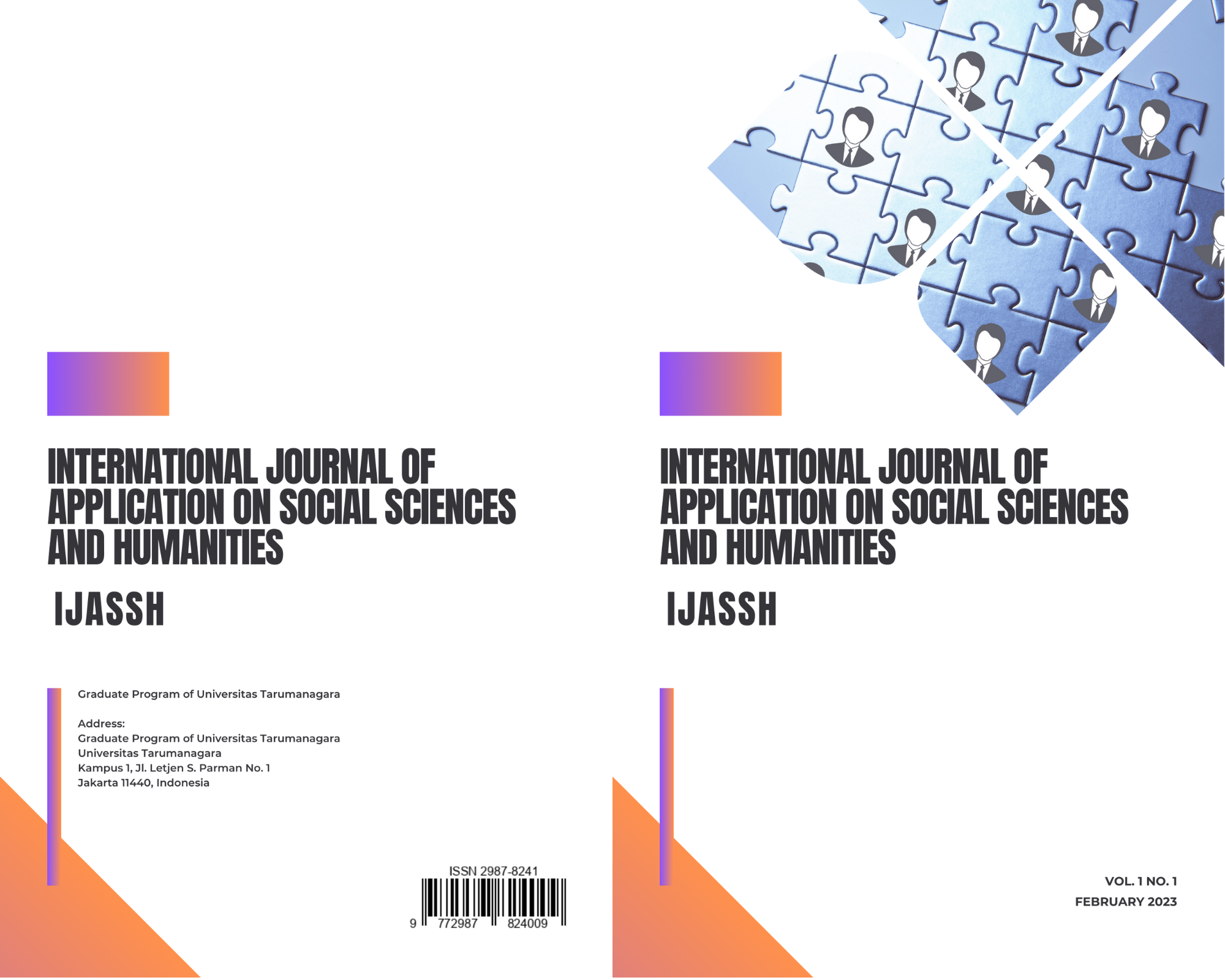INFORMATION NEEDS FULFILLMENT OF K-POP FANS THROUGH THE USE OF LYSN SOCIAL MEDIA
Main Article Content
Abstract
Technology development eases the process for humans to fulfill information needs by giving birth to new media. One form of new media is social media. Nowadays, to meet humans' information needs, we can use many social media, one of them is Lysn. Lysn is a social media that only provides information about K-Pop. This research aims to describe the fulfilment of K-Pop fans' information needs through the use of Lysn, uses several supporting theories: mass communications, new media, social media, uses and gratifications theory, information needs, and fandom. This research uses a qualitative approach with a case study method. Research data were obtained from observation, in-depth interviews with four informants, documentation, and literature study. This research shows that K-Pop fans get the fulfilment of their information needs through Lysn. Information obtained from Lysn has succeeded in meeting the five needs of audiences in media. In addition, K-Pop fans also expressed their satisfaction with the information obtained from Lysn. Lysn's presence positively impacts the K-Pop fandom because it provides a fun experience and information that cannot be found in other media.
Article Details
Section

This work is licensed under a Creative Commons Attribution-NonCommercial-ShareAlike 4.0 International License.
References
A. Josi, "Penerapan Metode Prototiping Dalam Pembangunan Website Desa (Studi Kasus Desa Sugihan Kecamatan Rambang) Stmik - Musiwaras Lubuklinggau", J. Teknologi Informasi Mura, vol. 9, no. 1, 2017.
A. Mulyana, R. Briandana, dan D. A. Puspa Ningrum, “Social Construction Fandom as Cultural Industry Marketing of JKT 48 Fan Group,” Int. Res. J. Bus. Stud., vol. 12, no. 3, pp. 257–266, 2019, doi: 10.21632/irjbs.12.3.257-266.
A. S. Cahyono, "Pengaruh media sosial terhadap perubahan sosial masyarakat di Indonesia", J. Ilmu Sosial & Ilmu Politik Fakultas Ilmu Sosial & Politik, vol. 9, no. 1, 2016.
Bahtiar, “Komunikasi Massa Dalam Media Critical dan Media Equation,” AL-HIKMAH Media Dakwah, Komunikasi, Sos. dan Budaya, vol. 10, no. 1, 2019, doi: 10.32505/hikmah.v10i1.1705.
Cosmopolitan, "7 Aplikasi yang Bisa Buat Kamu Lebih Dekat dengan K-Pop Idol", 2020, [Online]. https://www.cosmopolitan.co.id/article/read/7/2020/21095/7-aplikasi-yang-bisa-buat-kamu-lebih-dekat-dengan-k-pop-idol [Diakses 22 Agustus 2021]
D. R. Rahadi, "Perilaku Pengguna dan Informas Hoax di Media Sosial", J. Manajemen dan Kewirausahaan, vol. 5, no. 1, 2017.
E. Triastuti, D. Adrianto, A. Nurul, "Seri Literasi Digital: Kajian Dampak Penggunaan Media Sosial Bagi Anak dan Remaja", 1st ed. Depok: Puskakom UI, 2017.
F. N. Christian, "LKP: Rancang Bangun Aplikasi Informasi Tentang D-IV Fisioterapi Universitas Airlangga Berbasis Mobile (Android) pada HIMA D-IV Fisioterapi Universitas Airlangga", Skripsi, Universitas Dinamika Surabaya, 2021.
F. Tjiptasari dan M. M. Ridwan, “Kebutuhan Informasi Mahasiswa Fakultas Ilmu Pendidikan Universitas Negeri Yogyakarta,” Pustakaloka, vol. 9, no. 1, 2017.
Google Play Store, "Lysn", 2020, [Online]. https://play.google.com/store/apps/details?id=com.everysing.lysn&hl=en_US&gl=US [Diakses 15 Desember 2021]
H. Y. Kong, “The Globalization of K-Pop: the Interplay of External and Internal Forces”, Ph.D. Thesis, Hochschule Furtwangen University, 2016.
I. Novianto, “Perilaku Penggunaan Internet di Kalangan Mahasiswa,” J. Libri-Net, vol. 2, no. 1, 2013.
J. E. Wakas dan M. B. N. Wulage, “Analisis Teori Uses and Gratification: Motif Menonton Konten Firman Tuhan Influencer Kristen pada Media Sosial TikTok,” Tepian J. Misiologi dan Komun. Kristen, vol. 1, no. 1, pp. 25–44, 2021.
L. A. Saraswati dan N., “BTS ARMY’s #BTSLOVEYOURSELF: A Worldwide K-Pop Fandom Participatory Culture on Twitter,” KnE Soc. Sci., Nov. 2020, doi: 10.18502/kss.v4i14.7899.
L. Nindariati, “Kepuasan Komunitas Fans BTS Riau Terhadap Tayangan Billboard Music Awards 2018 di NET TV,” Saf. Sci., vol. 53, no. 1, 2019.
L. S. S. Utami dan S. Winduwati, “Fandom and Voluntary ‘ARMY’: Case Study on BTS Fans in Indonesia,” 2020, doi: 10.2991/assehr.k.201209.105.
L. Vendiagrys and I. Junaedi, “Setipe TIMSS Berdasarkan Gaya Kognitif Siswa Pada Pembelajaran Model Problem Based Learning", Unnes J. Math. Educ. Res., vol. 4, no. 1, 2015.
Lysn, "Tune into your personalized community – LYSN", 2019, [Online]. http://www.lysn.com/ [Diakses 30 November 2021]
M. F. Mwambakulu and P. A. Chikumba, “Smartphone usage patterns in public universities in Malawi: student perspectives,” South African J. Libr. Inf. Sci., vol. 86, no. 2, Jan. 2021, doi: 10.7553/86-2-1907.
M. Hasanah and M. F. NG Ratumbuysang, “Strategi Peningkatan Minat Wirausaha Mahasiswa Melalui Program Kreativitas Mahasiswa - Kewirausahaan (PKM-K) di Program Studi Pendidikan Ekonomi FKIP Universitas Lambung Mangkurat”, J. Socius, vol. 6, no. 02, 2017, doi: 10.20527/jurnalsocius.v6i02.3478.
N. Riani, “Model Perilaku Pencarian Informasi Guna Memenuhi Kebutuhan Informasi (Studi Literatur)”, Publ. Libr. Inf. Sci., vol. 1, no. 2, 2017, doi: 10.24269/pls.v1i2.693.
N. S. S. Putri, "Kesesuaian Pemberitaan Pilkada Daerah Khusus Ibukota Detik.com dengan Prinsip Jurnalisme (Analisis Isi Pada Pemberitaan Pasangan Calon Pilkda DKI Periode 2 Edisi 6-9 April 2017)", Skripsi, Universitas Muhammadiyah Malang, 2018.
R. W. Dewantara dan D. S. Widhyharto, "Aktivisme dan Kesukarelawanan dalam Media Sosial Komunitas Kaum Muda Yogyakarta", J. Ilmu Sosial Dan Ilmu Politik, vol. 19, no. 1, 2016.
T. A. Wulandari, “Internet Dalam Kajian Komunikasi Antarbudaya”, J. Common, vol. 1, no. 1, Jun. 2017, doi: 10.34010/common.v1i1.243.
Y. C. Tanjung and R. F. Marta, “Nilai Eksklusivitas Dalam Karya Foto Cover Majalah Tempo Edisi 4351 Tentang Kasus Bom Sarinah 2016,” J. Komun., vol. 9, no. 2, 2018, doi: 10.24912/jk.v9i2.181.
Y. Wu and D. Song, “Gratifications for social media use in entrepreneurship courses: Learners’ perspective,” Front. Psychol., vol. 10, no. MAY, 2019, doi: 10.3389/fpsyg.2019.01270.

